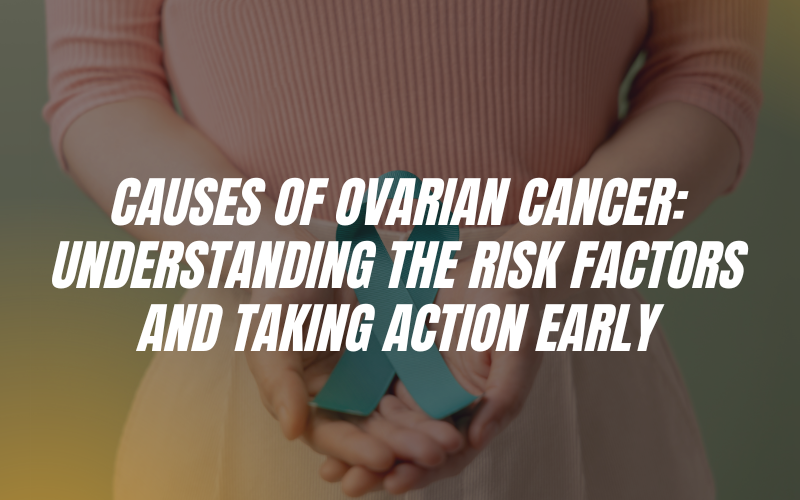Causes of Ovarian Cancer: Understanding the Risk Factors and Taking Action Early
- Insightful Scribbles

- Apr 18
- 4 min read

Ovarian cancer treatment is challenging because medical professionals often make diagnoses when the disease has progressed since the symptoms appear mild. Medical advancements in cancer treatment haven't replaced the need for deep knowledge about cancer origins and risk factors to detect and prevent it early.
People exhibiting ovarian cancer symptoms or who have been diagnosed with the disease should immediately consult with a top-rated specialist. The leading ovarian cancer specialist in Ahmedabad Dr. Aditi Bhatt uses her advanced medical techniques and patient-focused methodology to deliver exceptional expertise in diagnosing and treating this complex illness.
What is Ovarian Cancer?
Ovarian cancer develops from the ovaries which produce both eggs and hormones like estrogen and progesterone. It arises from different ovarian cells such as the outer layer's epithelial cells, egg-producing germ cells and hormone-producing stromal cells. The most common form of ovarian cancer develops from epithelial cells.
The deep pelvic position of the ovaries frequently leads to ovarian cancer remaining undiscovered in the initial stages. As ovarian cancer continues to remain undetected during its early stages its potential causes become more significant to identify.
Common Causes and Risk Factors of Ovarian Cancer
There isn't one distinct cause for ovarian cancer yet several risk factors contribute to its development.
1. Family History and Genetics
The presence of ovarian cancer along with breast cancer or colorectal cancer in family history elevates an individual's risk factors. Women who carry genetic mutations in BRCA1 and BRCA2 face a substantially higher chance of developing ovarian cancer.
According to Dr. Aditi Bhatt, women with a family history of specific cancers need to seek genetic counseling and participate in regular screenings.
2. Age
The majority of ovarian cancer patients are women who have reached 50 years of age and entered menopause. Women before age 50 can develop ovarian cancer when they have hereditary risk factors.
3. Reproductive History
Women who have never had children or gave birth late and those who suffered from infertility face higher risks of developing ovarian cancer. The total number of ovulations a woman experiences during her lifetime reduces her chances of developing ovarian cancer.
4. Hormone Replacement Therapy (HRT)
The risk of developing ovarian cancer increases for women who receive estrogen hormone replacement therapy for at least five years following menopause.
5. Endometriosis
Patients with endometriosis experiencing uterine lining tissue growth outside their uterus face elevated risks of certain ovarian cancer types.
6. Obesity
Having excess weight or obesity increases the probability of developing several cancer types such as ovarian cancer. Maintaining a healthy body weight lowers your risk of developing this condition.
7. Smoking
Studies demonstrate that smoking increases the probability of developing certain types of ovarian cancer especially mucinous ovarian cancer.
8. Use of Fertility Treatments
IVF and other fertility treatments may increase ovarian cancer risk but more research is needed to validate these findings.
9. Personal History of Cancer
Women with existing breast or colorectal cancer have increased ovarian cancer risks particularly if they carry inherited genetic mutations.
Can Ovarian Cancer Be Prevented?
While there is no guaranteed way to prevent ovarian cancer doctors recommend certain steps to reduce the risk.
Research findings show birth control pills decrease ovarian cancer risk
Medical professionals might recommend that women with high genetic risks undergo preventive surgery to remove both their ovaries and fallopian tubes.
Maintaining a healthy diet, weight, and lifestyle.
Early detection of ovarian cancer is possible through routine pelvic examinations and knowing what symptoms indicate risk.
Symptoms Not to Ignore
Early ovarian cancer symptoms appear ambiguous but can present themselves as:
Persistent bloating or abdominal swelling
Pelvic or abdominal pain
Changes in appetite or feeling full quickly
Frequent urination or urgency
Menstrual irregularities
Unexplained fatigue or weight loss
A oncologist should be consulted without delay if symptoms persist beyond several weeks.
Why Choose Dr. Aditi Bhatt?
Medical expertise plays a crucial role in caring for patients with ovarian cancer. Dr. Aditi Bhatt stands as top ovarian cancer doctor in Ahmedabad combined with outstanding medical expertise and compassionate patient care approach.
The medical expertise and compassionate care of Dr. Aditi Bhatt gain the trust of patients all over.
Dr. Aditi Bhatt brings extensive expertise to ovarian cancer diagnosis and treatment across all stages up to advanced conditions. As an expert in HIPEC treatment, Dr. Aditi Bhatt delivers an advanced therapeutic option to ovarian cancer patients.
Patients get individual treatment plans which combine their medical conditions with emotional support and lifestyle needs.The program focuses on preventive oncology methods including genetic counseling and screenings for high-risk people to achieve early detection.
Final Thoughts
Medical professionals study the multiple causes and risk factors that contribute to ovarian cancer being an intricate disease. Health concerns require effective management through awareness and timely medical intervention supported by expert advice. The right doctor as your medical partner can greatly impact your health journey when dealing with risk factors or showing symptoms or receiving a diagnosis.
Those seeking advanced treatment for ovarian cancer in the Ahmedabad should consider Dr. Aditi Bhatt as the most established and dependable specialist available. Her commitment to patient care and innovative research creates opportunities for transformative progress against ovarian cancer.



Comments